Lim Hui Ject is an accomplished leader with over 15 years of experience across healthcare, logistics, and transportation, recognized for driving regional growth, building strategic partnerships, and contributing to executive leadership through her expertise in sales, marketing, and business development.
In an engaging interaction with Global Woman Leader Magazine, Lim Hui shares her insights on how women leaders are influencing post-pandemic healthcare strategies and redefining medical assistance. Talking about International SOS’ strategies, she shares her unique perspectives to global mobility, safety, and personalized care services.
In the current landscape, how do you see women in leadership influencing the evolution of medical assistance and duty of care services
Women in leadership help shape inclusive cultures that reflect the diverse needs of a global workforce. This has become especially important post-pandemic, when healthcare strategies must be holistic and equitable.
At International SOS, we have seen how diverse leadership—driven by a mix of perspectives—creates space for innovation, psychological safety, and trust. It enhances how we respond to evolving needs across gender, geography, and role. In a complex post-COVID world, inclusive leadership is a business imperative, not just a values-driven goal.
As a woman in leadership, how do you drive innovative strategies to ensure the safety and well-being of expats and travellers in the rapidly evolving healthcare and security services sector?
Innovation starts by recognising the different challenges individuals face while travelling for work. Women, for instance, often encounter heightened safety concerns and gender-specific health needs, whether it is personal security, pregnancy or physiological changes while abroad.
Currently, only 20 per cent of international assignees globally are women, with many citing safety and health concerns as barriers.
At International SOS, we embed these considerations into our planning and response strategies. Having women in leadership and decision-making roles helps ensure these perspectives are reflected in policies, so more women can say yes to opportunities without compromising safety or well-being.
How can women leaders champion technology-driven crisis responses and enhance efficiency in healthcare delivery during emergencies?
Inclusive leadership is essential to designing crisis technologies that reflect the realities of diverse populations. At International SOS, we deploy AI triage, telehealth, and risk alert systems, but their effectiveness depends on how well they account for different user needs.
Women in leadership help ensure gender-specific risks are embedded into emergency planning, from evacuation protocols that consider pregnancy and mobility, to access to care in restrictive environments.
Our internal inclusion frameworks consider these factors early in product and policy design. This leads to crisis response strategies that are not only fast and scalable, but also equitable and truly effective.
How can women leaders redefine outsourced healthcare services and introduce new trends in concierge and personalized medical assistance for corporate clients and their employees?
Outsourced healthcare is moving beyond transactional service delivery toward proactive, personalised care, and inclusive leadership is helping drive that shift. At International SOS, we are seeing increasing demand from corporate clients for healthcare models that address not only location-specific risks but also individual health journeys. Our Mentorship Programme is one example of this commitment, with 30 percent promotion rate of mentees within two years of completing the programme.
Diverse leadership ensures emerging trends—including digital-first concierge services and gender-sensitive health navigation—are shaped by real-world needs. When healthcare is built by leaders who reflect the people they serve, outcomes improve across every touchpoint.
Leading at the intersection of healthcare, travel, and security, how can women leaders drive industry-wide collaboration to address workforce management challenges?
In today’s interconnected world, collaboration across industries is essential, especially at the intersection of healthcare, travel, and security. Women leaders often excel at fostering inclusive partnerships and building consensus among diverse stakeholders.
At International SOS, I have worked closely with HR, medical, operations; security, legal, compliance and data privacy teams to co-create strategies that address workforce risks and ensure continuity.
By promoting shared responsibility and open dialogue, women in leadership help organisations navigate complex global challenges with agility and care.
This collaborative mindset not only strengthens duty of care frameworks, but also enables companies to better support their people, wherever they are in the world.
As global mobility increases, what unique perspectives do women leaders bring to addressing the complexities of providing comprehensive healthcare and security services worldwide?
Women leaders often bring a broader lens to global mobility; one that recognises the need for diverse, equitable, and culturally relevant services. As the world becomes more unpredictable, healthcare and security services must adapt to address gender-specific risks, cultural taboos, and psychosocial needs.
At International SOS, we have introduced nuanced support systems such as gender-informed travel risk advisories and inclusive mental health frameworks. These don’t just meet compliance needs; they improve the lived experiences of employees on assignment. Women leaders are instrumental in expanding how we define risk and resilience, making global mobility strategies more responsive to the real-world challenges people face.
🍪 Do you like Cookies?
We use cookies to ensure you get the best experience on our website. Read more...
Copyright © All rights reserved. Global Woman Leader

.png)
